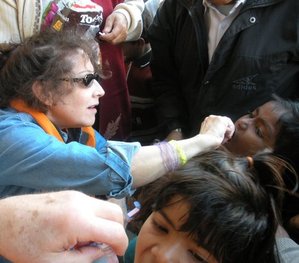Haddonfield Rotary in India
The Philadelphia Inquirer/Posted on Sun, Sep. 6, 2009

The writer gives drops of polio vaccine to a child in Uttar Pradesh, India, on Rotary-supported National Immunization Day.
Personal Journey: Beauty of India, smiles of children
By Susan Baltake, For The Inquirer
I always dreamed of experiencing the beauty and stark contrasts of India, and the perfect opportunity presented itself when I learned of Rotary International's role in the fight against polio.
Once a killer and crippler worldwide, polio is now endemic to only four countries - India, Pakistan, Afghanistan, and Nigeria. Each month, on National Immunization Day, Rotarians and public health workers throughout those countries immunize children under age 5 with the oral vaccine, aided by visiting Rotarians from around the globe.
The scope is stunning - 70 million children are vaccinated in a single National Immunization Day in India alone.
Our group of 11 traveled to India to play a small role in this effort, visiting Rotary-supported projects including an orphanage, a blood bank, and a school for young women and children. In Jaipur, we toured Bhagwan Mahaveer Viklang Sahayata Samiti, called the Foot Factory - the world's largest non-profit organization, providing 20,000 artificial limbs and 66,000 related procedures a year. We watched staff members custom-mold artificial limbs and feet, provide rehab therapy, and send patients out in just a few hours to work, walk, run, farm, and live complete lives. In the United States, the average artificial limb costs $8,000 to make. The Foot Factory cost: $40. Cost to patients: free.
Our team was dispatched to the 1,000-year-old city of Mathura in Uttar Pradesh, one of only two states in India where polio has been difficult to eradicate. The state is the most populous in India, with more than 166 million people.
Joined by local Rotarians, their spouses, and public health officials, promoted by roadside posters and banners, and equipped with trinkets and candy, our teams fanned out to sidewalk stations, where we gave two drops of the oral polio vaccine to each child, including infants. A 4-year-old girl carried her 8-day-old sister - both received the vaccine.
This was followed by immunizations a few miles - and a whole world - away, at a new, American-style gated community where each townhome had a marble driveway and an address sign indicating the credentials of the young professionals who make up India's growing middle class. We immunized those youngsters, and the children of construction workers.
It was remarkable to see women construction workers wrapped in bright pink, gold, and turquoise saris, carrying bricks on their heads. Men on the ground threw bricks, one at a time, to "catchers" building the second level of the home.
More typical vacation sights included the exquisitely jeweled Taj Mahal at sunrise, ancient Mughal forts and palaces, and chaotic roads where cars and buses mingled with bicycles, motorcycles, cows, elephants, and children riding donkey carts.
But the most memorable images were the beautiful, smiling faces of the children we helped keep polio-free.
Susan Baltake lives in Haddonfield, Camden County.